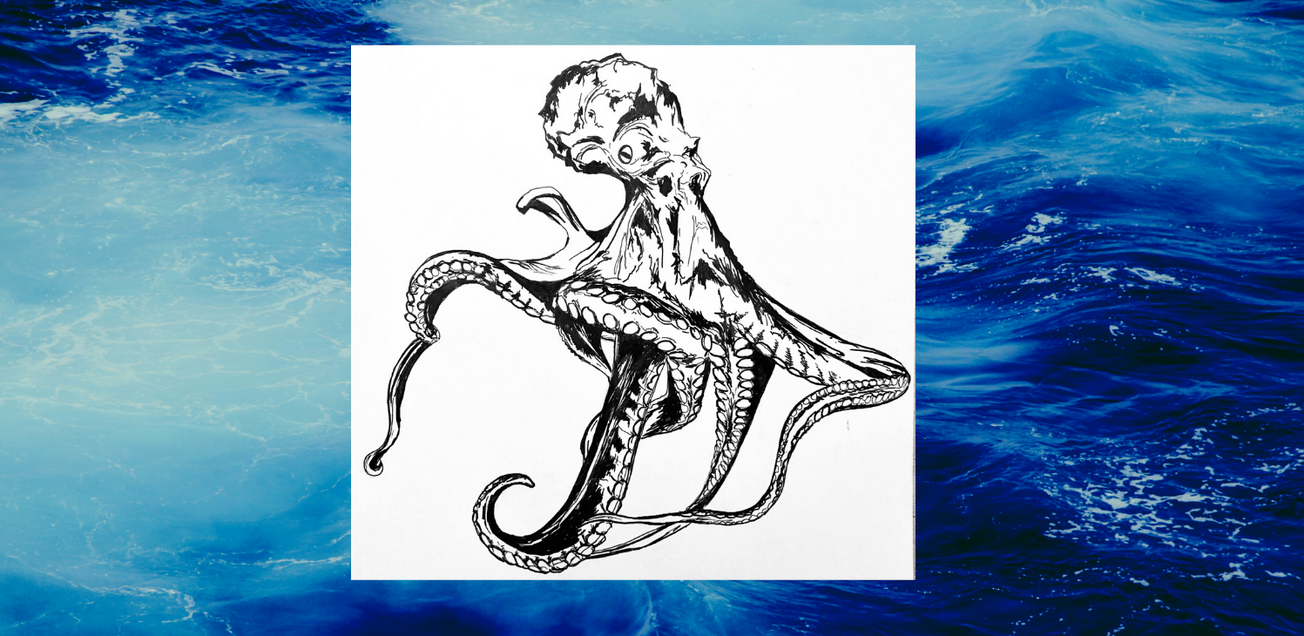By Lucy Catterall, First year, Biology
Epigram reviews Peter Godfrey-Smith’s 2016 book Other Minds: The Octopus, the Sea, and the Deep Origins of Consciousness.
We know more about the surface of the Moon than we do about the ocean floor; and yet, evolutionarily speaking, the latter is our home. At some point in evolutionary time, we shared a close family with the fore-bearers of the octopus. This would have been some strange creature with light sensitive impressions instead of eyes, without even a spine. Then, nearly 400 million years ago, our distant ancestors crawled, flopping and seal-like onto the wet, empty sands, as we left our aquatic cousins behind.
Other Minds explores these distant members of humanity’s strange extended family. Godfrey-Smith reveals that, despite our separation, cephalopods – a group of animals which includes squid, octopuses and cuttlefish – are astonishingly clever. Octopuses are charming, crafty and utterly alien in their intelligence. Unlike humans, they do not have a centralised nervous system. Instead, their brains are spread throughout their body, which is why tentacles wriggle seemingly without the octopus’ willing them to. They even move and respond to temperature after being separated from the body.
The most startling aspect of the book is how it details the challenges theories about our own intelligence. It was previously thought that humanity’s social behaviour and the difficulties of raising weak offspring were the origins of, and reasons for, our intelligence. However, octopuses are not particularly social, not usually monogamous, and yet have very sharp minds. It is not rare for an aquarium that houses octopuses to have a couple stories of escape attempts.
Octopuses, unlike mice and even cats, seem to have a distinct awareness that they are in captivity, so are on some level maybe even more sentient many other animals – or perhaps they are simply a lot more interested in being devious. However, is difficult to hold eye contact with an octopus and not be left with the strange sense of recognition, as if you are perceived in a special way while a cat or dog only looks at you blankly. And yet, their evolution was so separated from ours that meeting with an octopus is perhaps as close as we will ever get to meeting an intelligent alien.
Godfrey-Smith’s stories of his own encounters with wild cephalopods are entertaining too. The take-home message of all these stories is that, although often neglected by the general population, sea animals are just as charming and unique in temperament as a dog or a cat might be. He talks about accepting the offered tentacle of an octopus and being toured around an enclosure by hand, like being led by a particularly strange undersea child.
| Bibliotherapy: can reading an writing help mental health?
Godfrey-Smith also mentions a cuttlefish, a usually friendly animal, that flared vivid, violent red upon seeing him and chased him around the reef. Nothing could quell the cuttlefish’s rage and eventually he had to employ a strategic retreat. Other cuttlefish ignored him with a sort of obstinance, which is strange considering he is at least ten times the size of a cuttlefish, and logically should inspire if not fear then at least interest. Godfrey-Smith tried stopping in front of it; the cuttlefish continued to swim towards him, until, when it was a yard away, it shot him a look of pure displeasure and he slunk away.
Although often neglected by the general population, sea animals are just as charming and unique in temperament as a dog or a cat
This book is very engagingly written. Even without any scientific education, it is easy to understand and approaches topics at a beginner’s level. Godfrey-Smith clearly has a very great breadth of knowledge – every chapter introduces startling new ideas that reveal themselves like uncovering diamonds. I promise it will induce an enduring soft spot in readers for the slimy, squishy, boneless charmers which zoom around the coral reefs and sea floors all over the world. It is absolutely a recommended read.
Featured image: Epigram / Esme Hedley
Read a science or tech book that you enjoyed? Get in touch!









